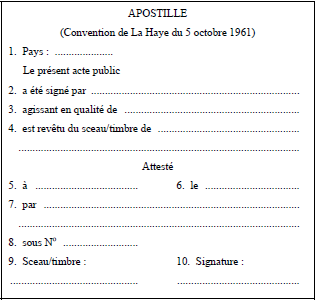APOSTILLE of a French document for a foreign authority
APOSTILLE OF DOCUMENTS, What is it?
What are the effects of an Apostille?
To which documents does the Apostille Convention apply?
How are Apostilles attached to public documents?
Model Apostille as annexed to the Convention

Procedures
Afghanistan
Angola
Arabie Saoudite
Barhein
Bangladesh
Belau ( Palau)
Bhoutan
Birmanie
Bolivie
Burundi
Cambodge
Canada
Chili
Chine
Comores
Congo (Rép. dém)
Corée du Nord
Cuba
Émirats Arabes Unis
Érythrée
Éthiopie
Gabon
Gambie
Ghana
Guatemala
guinée
Guinée Bissao
Guinée Équatoriale
Guyana
Haïti
Indonésie
Iran
Irak
Jamaïque
Jordanie
Kenya
Kosovo
Koweït
Laos
Liban
Libye
Malaisie
Maldives
Mozambique
Népal
Nicaragua
Nigeria
Ouganda
Pakistan
Papouasie (Nelle Guinée)
Paraguay
Philippines
Qatar
Rwanda
Sierra Leone
Singapour
Somalie
Soudan
Soudan Sud
Sri Lanka
Syrie
Tadjikistan
Taïwan
Tanzanie
Timor Oriental
Thaïlande
Turkménistan
Yémen
Zambie
Zimbabwe
Afrique du Sud
Albanie
Andorre
Antigua et Barbuda
Argentine
Arménie
Australie
Azerbaïdjan
Bahamas
Barbade
Belize
Biélorussie
Botswana
Brunei
Cap-Vert
Chypre
Colombie
Corée du Sud
Costa Rica
Dominicaine (Rép)
Équateur
Estonie
États-Unis
Fidji
Finlande
Géorgie
Grèce
Grenade
Honduras
Hong Kong (Chine)
Inde
Islande
Israël
Japon
Kazakhstan
Kirghizistan
Lesotho
Liberia
Liechtenstein
Lituanie
Malawi
Malte
Marshall (Iles)
Maurice
Mexique
Moldavie
Mongolie
Namibie
Norvège
Nouvelle-Zélande
Oman
Ouzbékistan
Panama
Pérou
Russie
Salvador
Seychelles
Suède
Surinam
Swaziland
Ukraine
Uruguay
Vanuatu
Venezuela
Authentication & legalization of French diplomas intended for a foreign authority.
Your Diploma must be a certified true copy of the original.
The document should include the following:
Certification stamp
Name, handwritten signature, and quality of the person in charge who certifies the copy
Seal with Marianne from the administration
And then by the Consulate.
